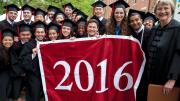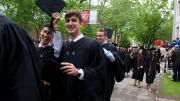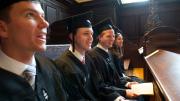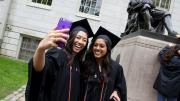“You are the class of Snapchat,” President Drew Faust told the graduating seniors of 2016 in her May 24 Baccalaureate address, referring to the app in which stories appear and then vanish just as quickly. Keep “telling your own story,” she told them, until they find their own voices.
Faust’s speech to the class revolved around this theme of storytelling—a meditation fitting for a historian.
“Harvard,” she said, “is a bastion of opportunity and unimaginable good fortune—for all of us, who find a place, with varying degrees of comfort, at the center of its long and successful narrative. And yet the burden is on us—to locate the discomfort, to act on the restless spirit of that legacy.”
Faust’s address alluded to some of the sources of her own discomfort, including a widely criticized placemat, distributed to freshmen in Annenberg dining hall, that provided stock answers to questions of social justice for use in talking with family during the holidays. (It was reportedly a collaboration of the College’s Office for Equity, Diversity, and Inclusion and the Freshman Dean’s office). This spring, Faust herself took on gender discrimination in the final clubs. She no doubt expected resistance from some male club members and alumni—but perhaps not the mass protest that was staged outside her Massachusetts Hall office by hundreds of members of all-female social groups, who felt their right to find comfort and support in the company of other women had been disregarded. As Faust noted wryly, she had “succeeded in disconcerting people on all sides of the many issues that you will soon be discussing with parents and grandparents over dinner—so in addition to a speech, for handy reference I’ve created a Placemat for Commencement, filled with useful phrases. Such as,” she said, “It’s ‘final club,’ without an ‘s.’”
Faust recounted many of the notable events of the prior four years, from “the time-honored Lampoon theft of the Crimson president’s chair—this time transporting it across state lines to Manhattan’s Trump Tower, for a staged photo op with a then dark-horse presidential candidate,” to the class’s efforts in the fight against malaria. She also noted engineering accomplishments by class members, from probing the atmosphere of an exoplanet to building “a better barbecue smoker, tested in a blizzard.”
But Faust made clear that she would not be the one to tell the story of the class of 2016—the class itself would. And the story will evolve. “Every story is only a draft. We re-tell even our oldest sagas—whether of Hamilton and the American Revolution or of Harvard itself.”
“Last month,” she continued, “one of my own heroes, Congressman John Lewis, came to Harvard Yard to unveil a plaque on Wadsworth House, documenting the presence of four enslaved individuals who lived in the households of two Harvard presidents. ‘We try to forget,’ he said, ‘but the voices of generations have been calling us to remember.’ Titus, Venus, Bilhah, and Juba—their lives change our story. After three centuries, they have a voice.”
“Telling a new story isn’t easy. It can take courage, and resolve,” Faust said. “It often means leaving the safe path for the unknown, compelled, as John Lewis put it, to ‘disturb the order of things.’ And during your years here you have learned to make, as he urged, ‘good trouble, necessary trouble.’”
She cited a joint astrophysics and folklore and mythology concentrator who “started a mentorship program for women of color to change the narrative of who enters STEM fields, and…wrote a science-fiction novel to tell a new research-based story about the galaxy.”
And Faust, who has been instrumental in the return of ROTC to campus, praised the “second lieutenant—one of 12 new Harvard officers who will be commissioned tomorrow—who will serve her country in the U.S. Marines, battling not only the enemy, but persistent gender divides.”
“Value the ballast of custom,” the president concluded, “the foundations of knowledge, the weight of expectation. They, too, are important. But don’t be afraid to defy them.”
Jonathan L. Walton, Plummer professor of Christian morals and Pusey minister in the Memorial Church, conducts the baccalaureate service. The ceremony has been a Harvard tradition since the seventeenth century, but now includes readings from Confucianism, Judaism, Christianity, and Hinduism, as well as the traditional singing of Psalm 78 to the tune “St. Martin’s,” an observance since at least 1806.












